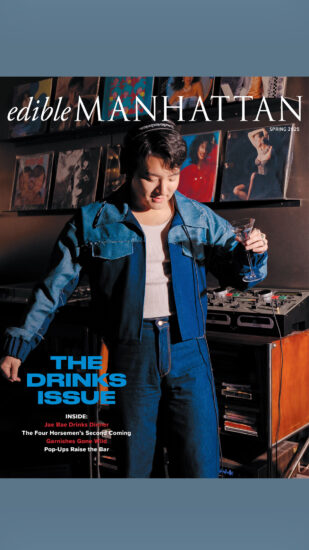
Editor’s note: We kicked off our first annual Food Loves Tech event last summer in Chelsea—here’s a recap. We’re bringing a taste of the food and farming future back this year, but just across the East River at Industry City. This story is part of an ongoing series about technology’s effects on our food supply.
For over a decade, chef Michael Anthony, alongside his incredible team, has been behind the evolution and innovation at Gramercy Tavern and, more recently, Untitled, both restaurants in Danny Meyer’s Union Square Hospitality Group family. His career is focused on service, which we’ve seen in Gramercy Tavern’s move to a “hospitality included” model and open dialogue about not only where the restaurants source their ingredients from but the story behind that decision.
We recently caught up with chef Anthony spoke with us about technology’s affect on service and sourcing, his commitment to people eating their vegetables and the evolution of chefs’ role in restaurants. You can catch him in action at this November 3-4 at Food Loves Tech where he’ll be making event-exclusive dishes. Learn more and get your tickets here.
Edible Manhattan: Over the past few years it’s become nearly impossible to talk about food without talking about technology. How have you felt this marriage in your own work?
Michael Anthony: It is really interesting how tech has risen to an active talking point. One of the most dramatic shifts is how people reach out and connect with restaurants. We’ve moved from phone to internet to mobile devices. Our restaurants had to react quickly and accordingly, relearning how to connect and communicate with current and potential fans. With respect to Gramercy Tavern, we’re lucky to operate a restaurant with a steady business, but if you’re walking around a neighborhood and stop into a restaurant to see how long a wait is, longer lines or lack of space was a turnoff from waiting it out. Now you can wait, worry-free, while walking around the neighborhood or having a cocktail before dinner and the restaurant can text you to see if you’re still interested in a table.
EM: So technology makes it so you no longer have to be in the sightline of a host or hostess in order to show your interest. But are you concerned that more technology creates a divide between the restaurant team and your guests?
MA: Not at all. If there’s anything we don’t want to do, it’s to hold you hostage.

EM: Gramercy Tavern has always been at the forefront of sourcing transparency. Part of the experience is knowing you’ll learn more about your food’s history throughout the meal. But now restaurants are including this information online or on iPads used for educational purposes. Will we see any shifts like this at the restaurants?
MA: At Gramercy Tavern, we have a learning culture that’s is so engaged that it’s ultimately the main reason people want to come and work and dine with us. With and without technology, people are craving authentic experiences. It’s no longer appropriate to approach a table and say, “These carrots are from upstate.” Rather, we look for clever ways to share information with people that want to hear it. Being part of our team is not about learning your lines.
EM: Which is often the type of experience we have with technology—it’s very standard information. When it comes to information and influence, how has your role as a chef shifted?
MA: My vocation has changed many times since I’ve been in this industry. Chefs were these mysterious characters who would sometimes grace the dining room. Now chefs are not only expected to be present in the dining room, but to share information with their guests. We’re expected to have strong opinions. It wasn’t so long ago that people were breeding varieties of plants that were drought and pest resistant. But now, chefs have entered the dialogue to talk about breeding plants for taste and color. We’re not just visiting farms but saying, “Here’s what I’m dreaming of: could you imagine breeding a habanada pepper without the searing heat that makes it impossible to use?”
EM: Where do you see technology going next in the hospitality industry?
MA: I think more and more restaurants will transition to a cashless industry, so diners can finish a meal, tap a payment and leave when they’re ready. This will also be an opportunity to gain valuable feedback on a meal while shaving 15 to 20 minutes off. I think shifts like this will be seen as an act of hospitality and not loss of human touch. As with our movement toward a service-included policy, we’re going to see a seismic shift in how we approach hospitality.



